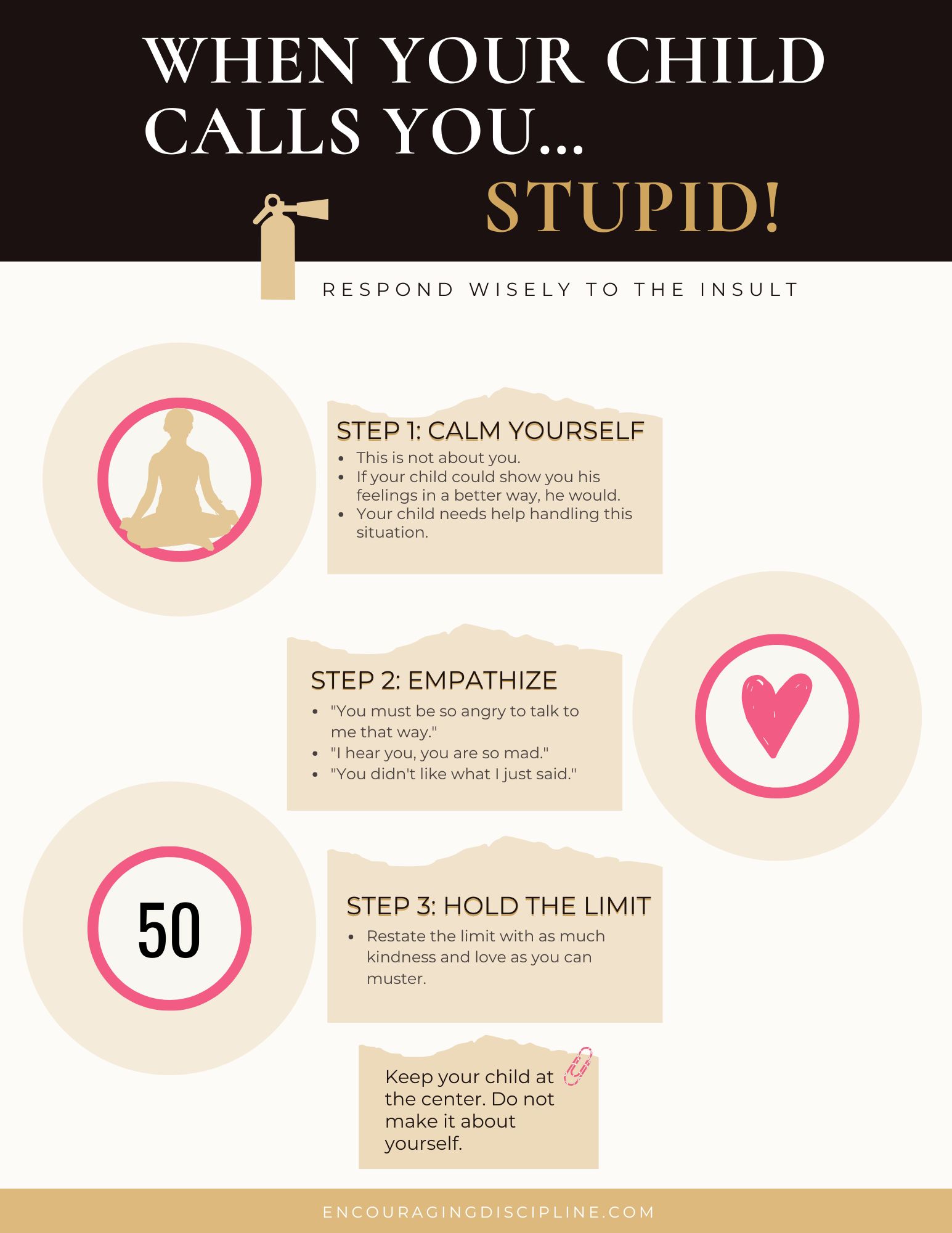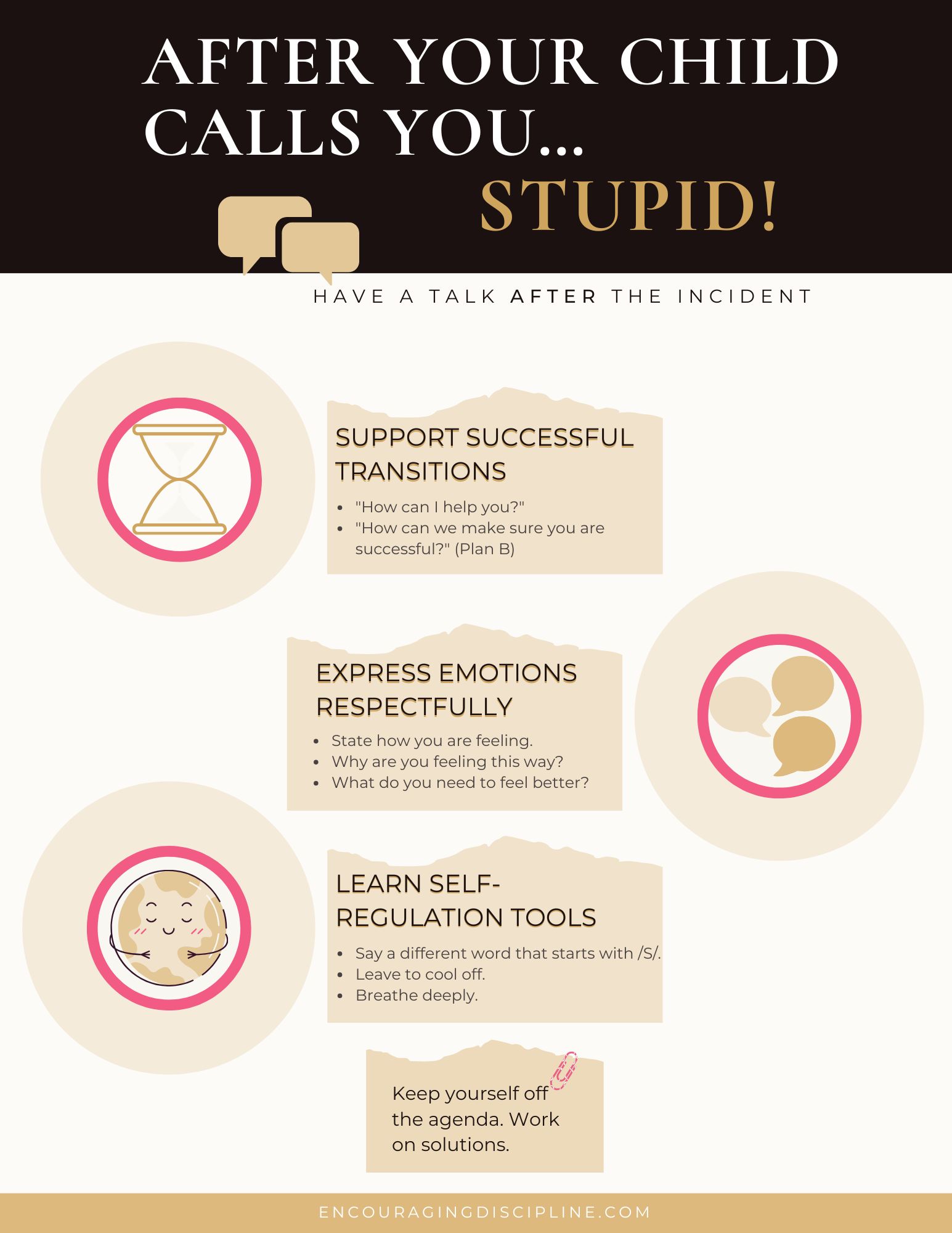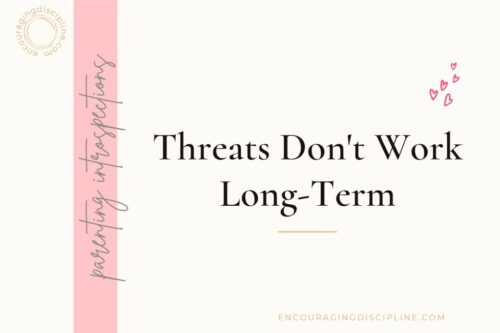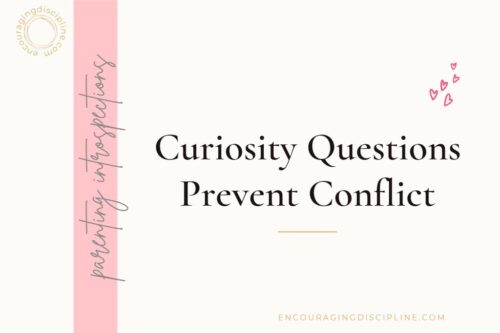What to Do When Your Child Calls You Stupid
I received a letter from a mother whose child calls her stupid when he gets angry, despite her talking with him about it multiple times. If your child has ever called you names (and I’m going to guess it’s happened or it will in the near future), then you know how hurtful, shocking, and triggering it can be. What should you do to nip this name-calling behavior in the bud?
Key points I will address in this post:
► 3 erroneous parental beliefs that undermine the success of our discipline strategies
► Why do kids resort to name-calling when they are angry
► How we can best handle it in the moment, preventing an escalation, and
► Talking with kids after the incident in a way that teaches self-regulation and encourages the respectful expression of strong emotions.
► At the end, I share a personal story about when my son called me stupid and how it unfolded.
Table of Contents
Yikes! Your Child Calls You Stupid!
Here is the letter that I received:
“[…]It was close to bedtime and my 5-year old was playing. I told him several times that bedtime was approaching, and I even gave him a 5-minute warning. When the 5 minutes were up, I told him to stop playing. He became angry and started yelling. I told him firmly that he can’t play any longer because we are going to bed. He then told me I was “stupid”.
He’s said this before, this is not the first time. We had a calm discussion about this in the past. I told him I didn’t like to be talked to that way, that we don’t talk to each other like that in our family, and that I felt insulted. I asked him if he would like to be talked to that way. He said, “no”. I also told him that I expected an apology so that I see that he understood that it’s not ok for him to talk to me that way. He apologized and promised he wouldn’t call me “stupid” again. Then tonight he got angry and did it again. […] Thanks for your help.”
Jen, mother of 2
Jen, thank you for reaching out. I am happy to offer some insight into this situation and hopefully, you will find it helpful. It’s really tough when your child calls you stupid and you handled it pretty well.
First I want to point out some good things that you did.
- You gave your child reminders to prepare him for the transition.
- And you had a calm discussion with him, in which you addressed the situation that was bothering you.
- Also, you pointed out that in your family that is not the way that you expect to be treated.
- You were able to identify the exact moment and event that triggers your child’s use of the word stupid.
3 Erroneous Beliefs That Undermine Our Discipline Goals
Now let’s look at the rest of your letter. I will start by pointing out the 3 erroneous beliefs that most parents have, that lead to frustration in this type of situation.
1. We think it’s personal
We think that the insult that our children throw at us is really about us and we allow it to hurt our ego. Below I will explain how this insult has nothing to do with us and how we can respond to it.
2. We demand that children apologize to make things better
I will clarify later why this apology is not helpful, and how it is only useful to our own ego. Instead, I will show you how to conduct a discussion with your child that leads to building family values.
3. We expect children to be able to do something after being told once
When we explain an expectation or rule to our children and they seem to understand and even promise to comply, the next time they break the rule can be very frustrating. I will show how children’s underdeveloped brain is not supporting their best intentions and how we can change our perspective to keep long-term goals at the forefront of our discipline approach.
Let’s examine these ideas in more detail.
Mistake 1. We Take It Personally
Verbal Expression of Anger is a Stage
When kids are very young, they express their anger with their bodies: by hitting, biting, throwing, or kicking. When they are a little older, and their language is more developed, they move on to the next stage: expressing anger through words.
Your child is making great progress, he is past the stage of physical expression of aggression and has moved into verbal expression. This is great news!
I know, probably not what you were hoping to hear. But I just want to emphasize that this is normal and expected, and he is developing on track.
First, children learn to control their bodies, and later they learn to control their words.
Children have to go through the physical and then verbal stages of expression before they learn to express their anger in a safe and respectful way.
Why We Take Name-Calling Personally
It can be very triggering when our children insult us. We can instantly go into rage mode and feel like unleashing our wrath on them. Just like they did when they insulted us.
All kinds of thoughts begin to circle in our minds. Should we let them get away with it? Will they disrespect us forever? After all that we do for them, this is how they treat us? It doesn’t feel fair.
You may feel heartbroken, angry, and disrespected. And you have every right to feel this way.
But know that it is your inner child who is vulnerable and feels all these feelings.
When your child is calling you stupid, you have to remember:
The words can’t hurt you if you know they are about your child, not you.
We get hung up on the word stupid and fail to address the cause beneath the behavior, which is what would change it ultimately.
The nasty words reflect how your child is feeling at that moment. Behavior is always a symptom of something going on below the surface. He was angry and lashed out. Children use bad words to express “negative” feelings in response to frustrating or upsetting situations. We all do, at least some of the time.
When you are able to summon your calm, observant, capable adult inside of you, then you can see and understand all this.
You can see your child’s anger and know that the way he expresses it is the only way he has available to him at that moment. If he were able to show you in a different, better way, he would do it.
Take the Child’s Perspective
When your child calls you stupid, it is an expression of his anger and frustration toward your boundary.
He has different priorities than you do.
Your priority is to put him in bed so he gets enough rest for the next day.
His priority is to finish his work, his play project.
From your child’s perspective, he was doing important work, but he wasn’t done, and you kept rushing and interrupting him.
Imagine you are working on something important and possibly very interesting and enjoyable. Your child keeps coming to you, “Mommy, mommy, mommy”, wants your attention, does not let you focus, then finally you have to stop. Most parents would snap at this point.
Understand that your child is taking his play very seriously and he needs you to treat it with the same respect that you expect him to treat your work.
So, if you need to interrupt his play, do so gently, and respectfully.
When your child calls you stupid, it’s not a sign of his lack of love or respect for you
Another very important point that I want to make is that your child loves you more than anything in the world. He did not mean to hurt your feelings! He was angry and frustrated, and his feelings got the better of him. Most children feel very badly after they hurt their loved ones. It doesn’t feel good to them to lose control.
Think of a time when you lost your temper with your child and yelled or became harsh with him. I bet you felt guilty and sad afterward.
Our children are human beings with the same emotional experiences as us.
Mistake 2. We Demand an Apology
When we demand an apology, it comes from our ego. Our ego is what separates us from our children. It doesn’t create harmony.
In this instance, we are on a high pedestal, we view the child as inferior and we expect them to make it right on their own. We don’t model empathy, forgiveness, and how to repair a broken relationship.
If this is the first time you are realizing this, there is no need to feel guilty about it. It is never helpful to dwell in shame and remorse. We do this unconsciously. But it is something that we can change. Once we are aware of what we tend to do when our ego gets hurt, we can stop our initial reaction and change course. Only this awareness and action empower us.
Related: Teaching Kids How to Offer an Empathic Apology
Keep reading to see how to discuss with your child in a way that builds trust and values. And you may even get a sincere apology, even if you don’t ask for one.
Moreover, if your child apologizes to you, it is not a guarantee he won’t call you stupid again. The only way that they will be able to not insult you again is to build up the self-control to not do it when they get angry. Which is a skill that they’re working on every day, but will not have fully developed until their brain is done growing, at about age 25 ☺.
This brings me to our third faulty belief:
Mistake 3. We Expect to Teach Once and for Children to Master the Skill
I would like you to think back to when you learned a new skill. Maybe it was playing tennis or skating. Someone probably explained and demonstrated how to do it. Then it was your turn to give it a try. Did you stay on your skates the first time you tried? If not, how many tries did it take?
When we teach our children something, their brains are soaking everything up. They get it. They agree with our rules, they understand how they would make our families run more smoothly. But when it comes to doing it, they flop. The reason for this is that they don’t have the brain capacity to control their impulses. There’s a disconnect between what they would want to do and what they can do.
The part of the brain that develops first is the emotional brain. The reasoning part of the brain continues to slowly develop until early adulthood.
That is why you will likely see the results much later when your child’s brain development catches up. They will continue to fail multiple times in the meantime.
The next time your child calls you stupid, try to remember that they are working on self-control. But they’re developing, they haven’t yet mastered the skill.
How to Respond When Your Child Calls You Stupid
First of all, when your child is angry, you can’t reason with them. The thinking part of their brain is shut down. Therefore, it makes no sense to begin explaining anything to them.
Also, when your child is in the red zone, they’re not capable of feeling empathy for you. For that reason, it is no use trying to explain to them how they’ve hurt your feelings. This is not a teachable moment, they are not capable of learning much.
And finally, it’s important to remember that when your child calls you stupid, it is their way of showing you how they’re feeling. They’re saying the worst word they can think of to make you see how bad they’re feeling.
The only thing that works to de-escalate the situation is to address their emotional brain. That means naming and acknowledging their emotions. When emotions are “seen”, they begin to dissipate.

Here is what to do when your child calls you stupid:
1. Calm yourself
The first thing you do is calm yourself down and remind yourself this is not about you, your child needs help handling their big frustration. Try not to react at that moment.
If you lash out, become defensive, or lecture your child at this time, they will become even more dysregulated and the situation will escalate.
2. Empathize
It is ok to tell your child they hurt your feelings, but don’t make a big deal out of it, and certainly don’t make it the focus of the interaction. Remember, the main point is to see your child’s feelings, and make it about them.
Some of the things you might say are:
- “Wow, you must be so upset to be saying that!”
- “Ouch, it really hurts when you call me ‘stupid’. You must be so angry.”
- “I hear you, you are so mad.”
- “You really didn’t like that I stopped your play. You weren’t finished.”
- “I told you to stop playing and it upset you.”
- “You didn’t like what I just said.”
These are some ideas for how you can acknowledge the upset that your child is feeling.
At this point, your child may begin to calm down and be willing to listen or they may become even angrier.
3. Hold the limit
If they’re calmer, you can restate the limit kindly and with empathy:
“I am sorry I had to stop you. I know how important this is to you. How about we take a picture of your work (or put it up here, on this shelf), and tomorrow you can continue working where you left off? It is time for bed now.”
If your child gets angrier, you have two choices:
a. Sit with them and allow them to have their tantrum about the boundary.
b. If it is hard for you to keep your calm, then you both take a time-out. You can say, ” You are really upset. And it upset me to be talked to that way. Why don’t we both take some time out to calm down? We can talk when we are both feeling better.” Then leave for a few minutes. When you come back, you acknowledge your child’s feelings again, then calmly restate the limit.
When emotions are low again, you can engage your child in reasonable conversation.
The one thing to remember is:
Do not make it about yourself. Keep the focus on your child.
Related: How to Deal With Tantrums
How to Talk With Your Child After the Incident
Later, maybe the next day, you can talk with your child calmly about what happened and decide together on a solution. I will describe this below.
When Your Child Doesn’t Know the Word Is Hurtful
If you suspect your child does not know the meaning of the word stupid, you can go ahead and explain it. Otherwise, don’t spend too much time “reviewing” the meaning and impact of the word. You could briefly remind your child, “You know that is a hurtful word. We don’t use it in our family. We speak kindly and respectfully to each other.”
Make speaking kindly and respectfully a rule and repeat it often, so that your child becomes very familiar with this value. Use frequent opportunities to remind them of this value, not just after an incident.
Avoid Putting Yourself at the Center of the Talk
Just like before, don’t make this conversation about you and how your child hurt you.
Your child needs you to be a strong leader, his rock. They have to feel that you are in charge. When small children feel like they have the power to hurt their big and powerful parents, it can cause them to feel unsafe. If you feel hurt and powerless, that is your inner child hurting, not your inner adult. And it is your job to take care of your inner hurt, not your child’s.
Your child knows very well they were wrong, they know they hurt your feelings. And they are most probably feeling really bad about it. They may even begin to think they’re a bad kid.
If you keep pounding on the idea that they hurt your feelings, you are rubbing salt in their wound. It will be a confirmation of their budding thought that they are a bad kid.
So it is very important to separate the child from the behavior. You can even state it clearly, “You are a good kid and I know you love me very much. You wouldn’t mean to hurt me. But your anger controlled your reaction there. What do you think you could do next time to not let it take over you like that?”
This way you are empowering your child. You are putting the blame on the anger and showing them that they have the power to do something about it.
Work on Solutions
The purpose of the after-talk should always be to find a solution. Remember, your child feels bad about what they did. Your job is to help them not do it again. You are trying to protect them from creating bad beliefs about themselves by having repeated situations in which they hurt others.
“At that moment, that’s all you could think of to say to show me how upset you were. Let’s think together of what you could say next time to let me know you are upset so that I can help you.”
Again, when having a calm discussion, show empathy.
“I know you really wanted to keep playing and I came to stop you. You felt frustrated that I interrupted your work. And it was important for you to finish. I am sorry.”
Instead of rehashing old wounds, focus on discussing solutions for the future.

Make a plan
In this step, you want to include two questions:
1. ”How can I help you stop playing when it is time to go to bed?” – Here your child may suggest giving warnings or you can suggest some ideas.
2. “How can we make sure you are successful?” – This question is a backup plan. What if I give you the warning and you still can’t stop?
The point is to help your child meet the expectation. For example, transitioning successfully from one activity to the next.
When there is a common agreement, kids are more likely to be successful at cooperating, because they remember the deal and they were the ones who suggested the strategies. You get their buy-in because giving a 5-minute warning was their idea, not yours.
Express frustration safely and respectfully
It’s important to help our children know that they don’t need to resort to hurtful words to get us to listen to them. We can let them know that we will always listen and help them when they need us. And we can teach them a different way to communicate their needs to us.
Teach your child to say what they’re feeling and ask for what they need. This may take a bit of practice, but it can be very helpful.
I teach my kids to say three things:
- How they are feeling
- What caused them to feel this way
- What they need to feel better.
Here is an example:
- “I am so mad right now.“
- “You are not letting me finish building my Lego city.“
- “I need 5 more minutes.”
To help kids understand more about anger, where it comes from, what it means, and how to handle it, you can show them some really engaging videos from Go Zen! You can sign up to get a few sample videos based on your child’s age. They are research-based and very effective.
Using self-regulation tools
There are some in-the-moment tools that you can teach your child for when they want to call you stupid or other bad words:
- Say a different word. It can be a silly word that starts with the /S/ sound, like “salamander“, or “salami“. Or it can be a nonsense word. Saying a silly word may diffuse your child’s anger.
- Another good skill is to leave the scene.
- Breathe to find calm.
Be encouraging and understand that you will not see instant results. Your child will continue to fail multiple times. But that doesn’t mean their brains are not working on these skills.
After a failed try, you can ask them, “Did you remember to use the tools we talked about? No? That’s ok, you’re still working on them. I am sure one day you will be able to stop yourself from calling me bad names. You can try again next time. Every time you try, your brain gets stronger. It will get easier with time.”
One time, my daughter told me she tried using the strategy we had talked about, but she didn’t succeed. And I told her, “That’s ok. I am glad you remembered it. If you keep trying, one day you’ll be able to do it.” I viewed this as progress.
In this way, you are encouraging your child. You are showing them you believe in them and their goodness and you trust that they can do this. Just not yet.
Related: Teach Kids Effective Calm-Down Tools
Final Thoughts
The thought I would like to leave you with is that your main focus, especially when kids are younger, should not be to stop your child from using the word stupid when they get angry. Rather you need to find out what’s behind the anger. And also, kids need our help to learn to manage their frustration.
Offer a hug. Show your child you forgive them.
Remind yourself your child is good and will turn out all right with your wise and loving guidance.
Personal Story: When My Child Called Me Stupid
Recently, we upgraded the closet in my son’s bedroom. He was so upset by this! He started crying and yelling at me, demanding that I put back his old broken shelf. Shortly after, he told me I was “stupid, the stupidest mother in the whole world”.
As he was crying and getting angrier, I sat by him, speaking softly, acknowledging his feelings, and telling him that, no, I wouldn’t change back the shelf.
It turned out this was not just his usual resistance to change. After what felt like a long while, he finally said, “I don’t want to be able to reach my clothes by myself. I want you to keep helping me get them.” Bingo!
A couple of weeks before, on the night before my son turned 5, he had a big meltdown. He said he didn’t want to grow up and not be with me any longer. So, when he mentioned that he wanted me to keep helping him, I knew this was about his fear of separation from me.
A few days before, I had mentioned that he would be able to reach his clothes so much easier in his new closet. What I thought was a great advantage, to him was a sign of independence that he didn’t feel ready for.
So, after he admitted his fear, I promised I would always help him whenever he needed me, and he would always be my sweet boy. He stopped crying a few minutes later and began drawing with a smile on his face.
My son was the most loving, calm boy for the rest of the day. He is now fine with his new closet.
Find the Hidden Cause
In the end, my son’s outrageous and hurtful reaction was about his fear. For your son, it may be that he feels he is not understood. You know him best and you’ll have to find out. But you can only do this when you are able to separate yourself from the heat and realize this is not about you, it’s about your child.








My 4 year old just called me stupid as I was telling her to go to bed. She was taking her time doing her reading and I said we will have to continue the following day. This made her really upset and she started crying and called me stupid. I was alarmed because this was the first time she ever said anything like this so I went straight to Google to find out how to deal with such a situation and I found your article. Thank you very much. I will put what you suggested into practice and hopefully it will work for us. Our other major issues are that she backchats and doesn’t listen to me most times. She is a very clever loving 4 year old and I love her to bits. However, I would really appreciate if she could listen a bit more even to her teachers and not backchat
Many thanks
Rachel
Rachel, I am so glad you found my article which talks specifically about the issue that you are having with your 4-year-old. I hope the ideas I wrote will help. Remember everything takes time. Don’t be discouraged if the techniques you are trying out don’t work out the first time. Also, now that my children are 6 and 8, I look back and realize how afraid I was that certain behaviors would become engrained and might define my kids forever. Not so. They outgrew most of the behaviors that used to scare me. Having this perspective helps me now to deal more calmly with new unpleasant behaviors that they’re trying. Good luck and don’t hesitate to reach out if you have any questions.
What if they *start* doing these behaviors at age 7? My boy has always been a hitter and he still does that…now name calling has been added to his arsenal and he’s just branching out with his words, adding more insults over time. It is so disheartening.
Veronika, I can feel your pain and worry in your message. It can be so discouraging when our kids seem to be getting worse, not better as they grow older. But I would like to give you some hope. It is natural and developmentally expected for children to first express their anger with their bodies by hitting, scratching, kicking, and so on. Later, as their language develops, children express their anger less physically and more verbally. Anger doesn’t use kind words, so insults, swearing, and such are common ways to blow off steam. So one good thing is that your son seems to be progressing through the developmental stages as expected. Now you would come in, just like I explained in the article, with compassion and empathy, listening to his anger and making him feel understood. His anger will only subside if it feels heard. Think about how you would like your partner or friend to react to you if you come home angry from work. Then, when your son is calm, you can talk to him about how hurtful insults can be. And then you begin teaching him other ways of letting his anger out. This will take time, as his brain development needs to catch up with what these advanced skills require him to do. If you have serious concerns and feel like there is more going on than just occasional angry outbursts that are normal for children his age, then please contact the school counselor for help. Sending you a warm virtual hug 🤗
I am a nanny for my 12 year old granddaughter. I am struggling with her name calling an angry outbursts. I was a state child growing up with a fragile inner child now. Learning how to see this as stage of her emotion development . Being able to recognize what’s happening in the moment, having emotionally safe responses that guide me to support her development and self esteem at a time when both her and I need help . I can’t thank you enough
Sue, you are doing such great work! You are aware of your own inner experience and trying to respond to your granddaughter in a way that is supportive rather than damaging. 12 is not an easy age! Kids’ brains are going through lots of changes, and their rational brain is hijacked easily, similar to when they were toddlers. They need us to be their stable, loving rock to help them get through these tough pre-teenage and teenage years. It makes me really happy that you are finding support and encouragement in my work. Hang in there. 💝